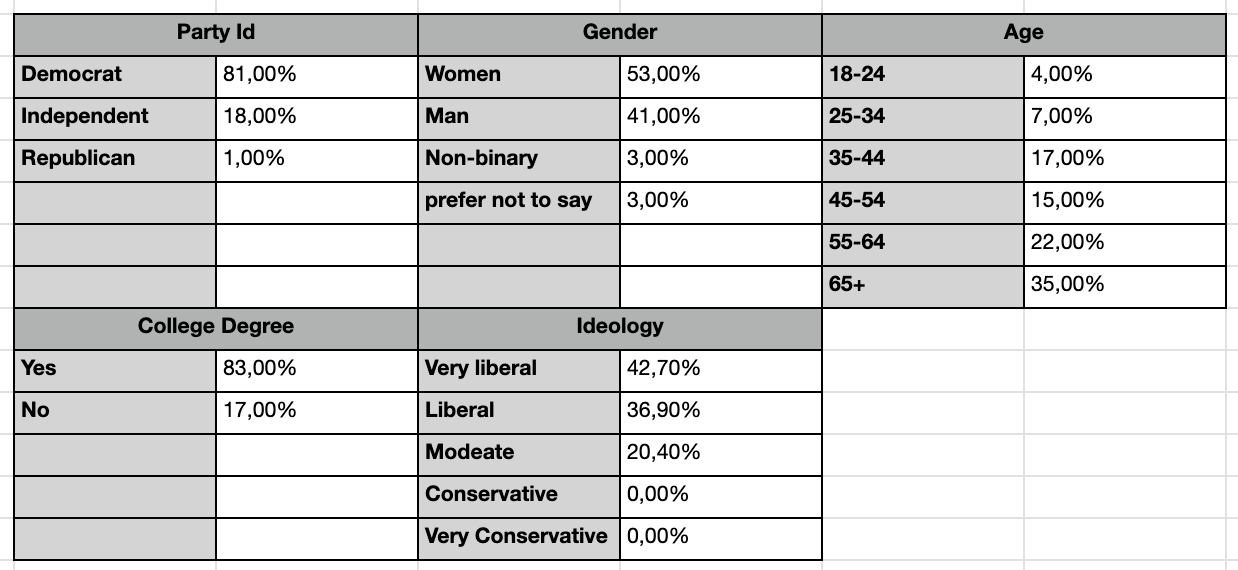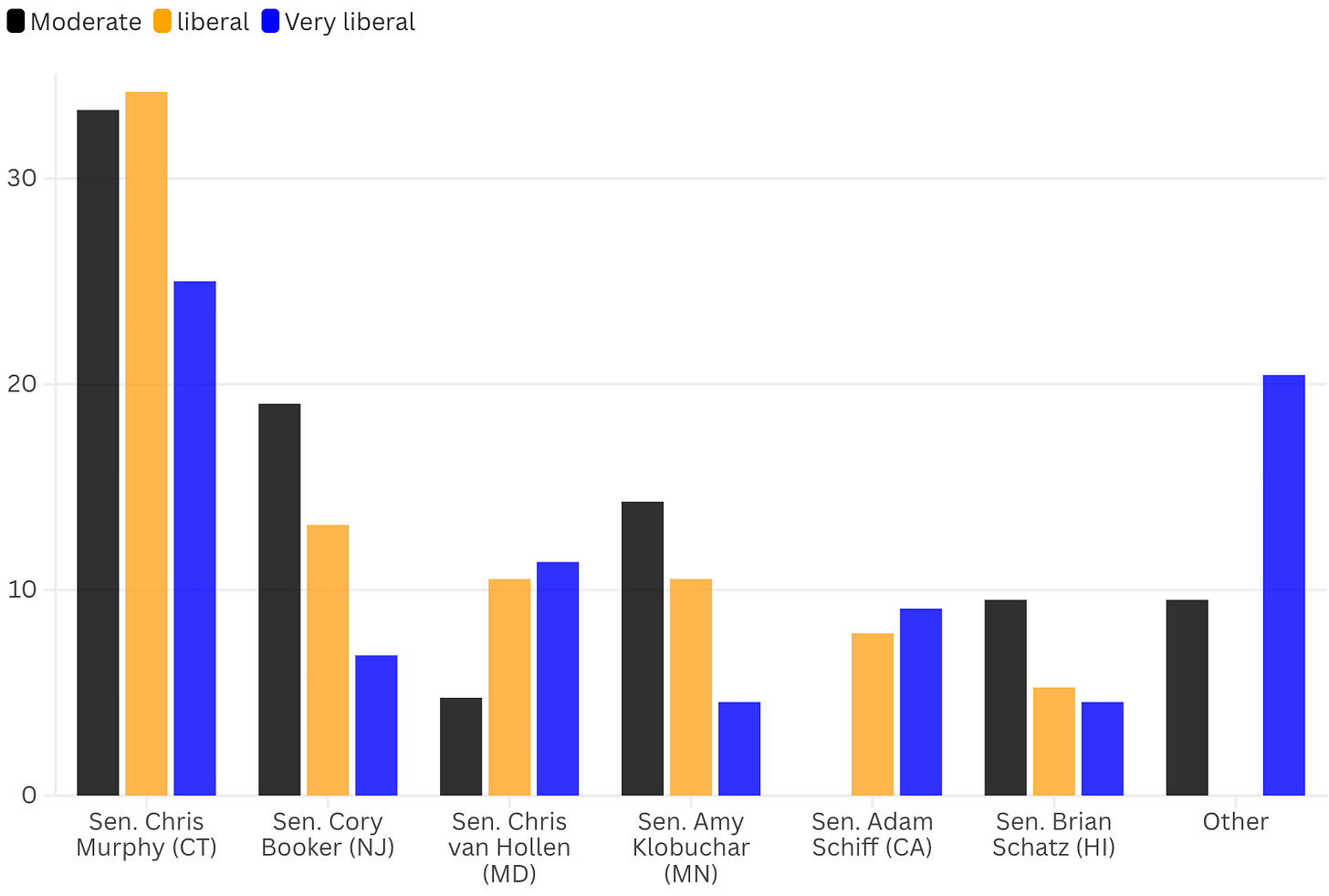Poll: Sen. Chris Murphy has overwhelming support to lead Senate Democrats
The Poll results are here: A highly college-educated sample shows Sen. Murphy (CT) leading with almost all groups. "Very Liberal" voters show their discontent with Senate Democrats.
We all know one thing: Chuck Schumer (age 74), the current leader of Democrats in the Senate, is more unpopular than ever before.
From May 23rd to May 30th, I conducted an online poll to find out who Democrats want as their Senate leader if Schumer steps down. I’ve gathered 103 responses from people across different demographic groups.
While the sample is decent enough to give us an idea of who Democratic voters want as their Senate Leader, it is too small to get weighted to match the profile of the Democratic voter base. Therefore, the poll is not representative of Democratic voters, but that’s fine. The sample size of n=103, as well as the distribution across different demographic groups, can tell us a lot since the results are quite clear.
Key findings:
Sen. Murphy leads across most demographic subgroups
The highly educated and older-than-average sample might be strengthening his support
“Very liberal” voters show dissatisfaction with Senators by choosing the “other”-option
Among our 103 respondents, Senator Chris Murphy (CT) was the clear favorite, with just above 30% of the votes. Sen. Murphy has repeatedly gotten attention with his sharp and energetic line of questioning during Senate hearings. Cory Booker (NJ), who got a lot of news coverage for his record-breaking Filibuster speech on the Senate floor, finished a distant second place with 11,6%. Senators van Hollen (MD) and Klobuchar (MN) followed with just shy of 10% support.
Almost 11% of respondents did choose the “other option”. Some of those wrote in non-senators, like Representative Alexandria-Ocasio Cortez (AOC), who would have received around 6% of the votes. She wasn’t included as a candidate in the results since she is not yet eligible for the role of Senate leader.
Now, how much can these unweighted results tell us? Let’s dive into the demographics of the sample before we look at how each group voted.
unweighted Sample demographics (n = 103):
Note: Respondents for this online poll were contacted randomly through social media channels (largely BlueSky).
The best part of this sample is the gender divide. It’s a women +12 sample, which is not too far off from the weighting in pollster samples for Democratic Primaries (Women make up around 60% of Democrats, men make up 40%).
The Party ID divide is also pretty decent with 18% of self-identifying independents. Independent voters can make up 20-30% of the Democratic primary base.
The biggest problem here is the extreme overrepresentation of college-educated voters. They make up 83% of the sample but only around half of Democratic voters (although that number is rising)
The older age groups are also overrepresented. All in all, it’s a sample that’s too educated and too old compared to the Democratic primary base. But does this matter? Would a larger, weighted sample have changed the results?
Probably not, since Murphy leads among almost all subgroups. Let’s take a look at those subgroups and their choice for Senate leader.
College vs. non-College educated voters
Sen. Murphy holds a commanding lead with both college and non-college-educated voters. It seems unlikely that Sen. Murphy’s large advantage would vanish if the non-college share of the sample would be more adequate. Especially since Murphy’s lead is even larger with the non-college group, but this subgroup is way too small in the sample for us to get anything significant.
Let’s skip to the demographics that are large enough to tell us more.
Ideology
Sen. Murphy leads with all groups: Moderate, Liberal, and Very liberal.
“Very-Liberal” Democrats were more likely to refuse to choose a current Senator, making up almost all of the “other”-votes. This may be due to dissatisfaction with elected Democrats on the left. No Senator is seen fit and answers included non-Senators like AOC or Rep. Jasmine Crockett.
Gender
Sen. Murphy leads with both men & women: He has 26% support among men and 35% support among women.
Support among non-binary voters is split evenly.
Women make up 53% of the poll sample but around 60% of Democratic voters, meaning they are slightly underrepresented.
Final thoughts
Even if the poll is not representative of Democratic voters, it gives a good idea of who Democrats might favor to lead them in the Senate.
Sen. Murphy’s commanding lead, which spreads to almost all demographic subgroups, paints a pretty clear picture. We can say that he is very likely the preferred candidate for most college-educated, older Democrats, and that’s a pretty large group. We would need a larger sample with more non-college voters to be able to say something about all Democrats. Although I doubt that the results around Sen. Murphy being the preferred leader would change much. Also, the abnormally high votes for “other” among very liberal voters point to a widely spread dissatisfaction with current Democratic Senators in this specific group.
Feel free to share your thoughts and feedback about the results below.






